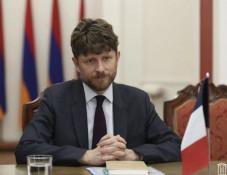
Expert says constitutional reforms proposed by Armenian authorities are ‘unconstitutional’
The constitutional reforms proposed by the Armenian authorities are “unconstitutional”, a Constitution expert, Gohar Meloyan told a press conference on Monday.
The expert stressed the government’s move to draft amendments to the law on the Constitutional Court (CC) is yet another phase of the political developments surrounding the highest court which have been initiated by the authorities.
“The bill is aimed handling the artificial crisis in the Constitutional Court by the ruling party. The crisis is artificial because the existence of a crisis in any constitutional body makes it impossible for that body to carry out its constitutional duties and functions. And in this case, we have been clearly seeing for two years how the Constitutional Court has effectively exercised its powers, successfully cooperating with both the legislature and the executive powers, as well as the president’s institute,” Meloyan said. “That is, all the applicants of the Constitutional Court had the opportunity to receive a proper and final decision on their applications. This pertains to the fact that there is no crisis in this body.”
According to Meloyan, Articles 168 and 169 of the Constitution envisage that the Constitutional Court determines the conformity of the draft constitutional amendments and the conduct of a referendum with the Constitution. If a constitutional reform or a referendum takes place in Armenia, the top court’s positive position is definitely needed, the expert explained.
“Article 169 next outlines the scope of subjects entitled to apply to the Constitutional Court. The logic of this article is divided into two parts: subjects that can apply to the CC and subjects that are obliged to apply to the CC. The National Assembly is obliged to apply to the Constitutional Court in case of specific constitutional amendments. It is evident that the Constitution stipulates that the Constitutional Court's position on constitutional amendments is mandatory. It stems from the worldwide law enforcement practice. This is the exercise of the important function of the CC's preliminary control,” Meloyan noted.
The expert states before the constitutional amendments, the Constitutional Court should exercise preliminary control over whether these amendments will not contradict to the Constitution in the future. If the authorities try to use an alternative approach, that is, not to apply to the Constitutional Court, then a crisis situation will emerge in the country since an anti-constitutional international act may be adopted. "Our country is obliged to to give preference to the Constitution, but in this case it will also violate international obligations,” she added.
On May 30, a ruling My Step faction MP presented a draft law on making amendments and supplements to the Constitutional Court law, which, according to Meloyan, envisages constitutional amendments without applying to the Constitutional Court.
“The National Assembly will vote on the issue of constitutional amendments and if they get the necessary votes, they will not apply to the Constitutional Court.
“That is to say, an obvious attempt is made to override the obligation to apply to the Constitutional Court, which directly contradicts the requirements of our Constitution. In addition to the Constitutional Court, there is also an attempt to override the president’s institute. If there is a demand to apply to the president of the country, who signs and publishes a decision within 21 days after making it, the new measure removes that demand, envisaging that the parliament speaker signs and publishes it,” said noted,
According to Meloyan, the draft law is a very dangerous move against the rule of law, since it violates the basic principles of the rule of law and democracy. “There are mechanisms of deterrence and counterbalance to prevent a body from making monopoly decisions on its own," she said.
“A faction of the National Assembly, having a qualified majority, without reaching a consensus with the opposition forces, can submit a draft law bypassing the two constitutional bodies – the president of Armenia and the Constitutional Court, meanwhile breaching the rule of law, the principle of legality and all the basic principles and legal regulations of the people-based state,” Meloyan said.
Newsfeed
Videos






























